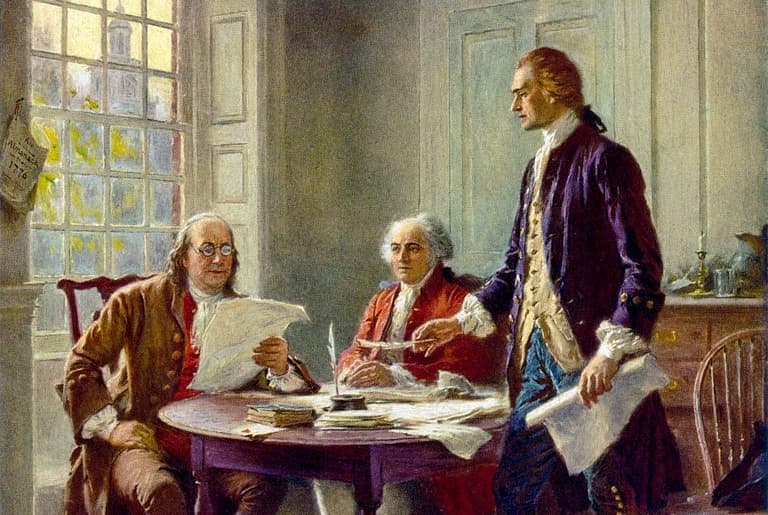Yanks Feeling Pessimistic About Their Country Can Repair to the Declaration of Independence. That’ll Provide a Lift
Americans in 1861 had the chance to bridge the nation’s political divides short of bloodshed. We can seize that same opportunity on Independence Day, our columnist writes.

As Americans celebrate Independence Day, the nation is wracked with divisions that raise concerns about a second Civil War. As we wonder if this House divided against itself can stand, wisdom from the Sun in the first month of fighting inspires us to recapture the Spirit of 1776.
Ahead of the July 4 holiday, the Sun reported on Friday, “Americans are feeling pessimistic about the country,” citing a survey from Fox News, Beacon Research, and Shaw and Company which found that 43 percent “feel like the nation’s best days are ahead of us while 48 percent think they are in the past.”
An August poll by the Economist and YouGov found similar pessimism, with 66 percent believing “that political divisions in this country have gotten worse since” President Biden’s inauguration in early 2021, and 62 percent “expect an increase in political divisions.”
As war clouds gathered 160 years ago, Americans had a similar crisis of confidence as Southern states threatened secession, but the Sun set its sights on a brighter future that seemed impossible, anchoring their faith, as President Lincoln did, in the Declaration of Independence itself.
Lincoln called the Declaration “a rebuke and a stumbling block to tyranny and oppression,” the theme of his 1858 speech at Lewistown, Illinois, during his campaign against the Democratic candidate, Judge Stephen Douglas, for a seat in the Senate.
“If you have been inclined to believe that all men are not created equal in those inalienable rights enumerated by our chart of liberty,” Lincoln said, “let me entreat you to come back. Return to the fountain whose waters spring close by the blood of the Revolution.”
Lincoln urged voters to “come back to the truths” of the founding document, and whether supporting him or Douglas, to “heed these sacred principles.” Success at the ballot box was unimportant by comparison. “I am nothing,” he said, “Judge Douglas is nothing. But do not destroy that immortal emblem of humanity: The Declaration of American Independence.”
On May 9, 1861 — 27 days after Confederate forces fired on Fort Sumter — readers of the Sun read a story at the top left of the front page which laid out the importance of the struggle to preserve the Union and framed it as an aspirational renewal of the Declaration.
The Sun sought to soothe fears, optimistic that the war would be “a moralizing as well as a demoralizing force” for the nation, a “righteous war … which stirs to a higher type of manhood … beneath its banner of honor and by its watchword of right.”
The war would change America in positive ways, the Sun predicted. “The Revolutionary War bred heroes, and it trained this nation to manliness and liberal life for years. The Declaration of Independence was a gospel, because it was a declaration in the name of God.”
The Sun cast the war as “the second edition of that Declaration, revised and enlarged, because silly critics and stupid blockheads have pronounced the former a sum of ‘glittering generalities.’ … We believe this war to be the war of American Independence continued and complete.”
In February, as the national Peace Conference sought conciliation, the Sun had stood against secession. “The organizers of the Southern Confederacy,” it wrote, “think that the union is but a ‘wisp of a straw’ which they can break or destroy at pleasure.”
The Sun then expressed confidence that President Lincoln, whose election had sparked the crisis, would do “whatever justice and the permanent welfare of the country will sanction to restore and preserve the integrity of the federal union.”
Americans in 1861 had the chance to bridge the nation’s political divides short of bloodshed. We can seize that same opportunity on Independence Day, returning to the fountain of the Declaration and ensure that America remains, in Lincoln’s words, “the last best hope of earth.”

